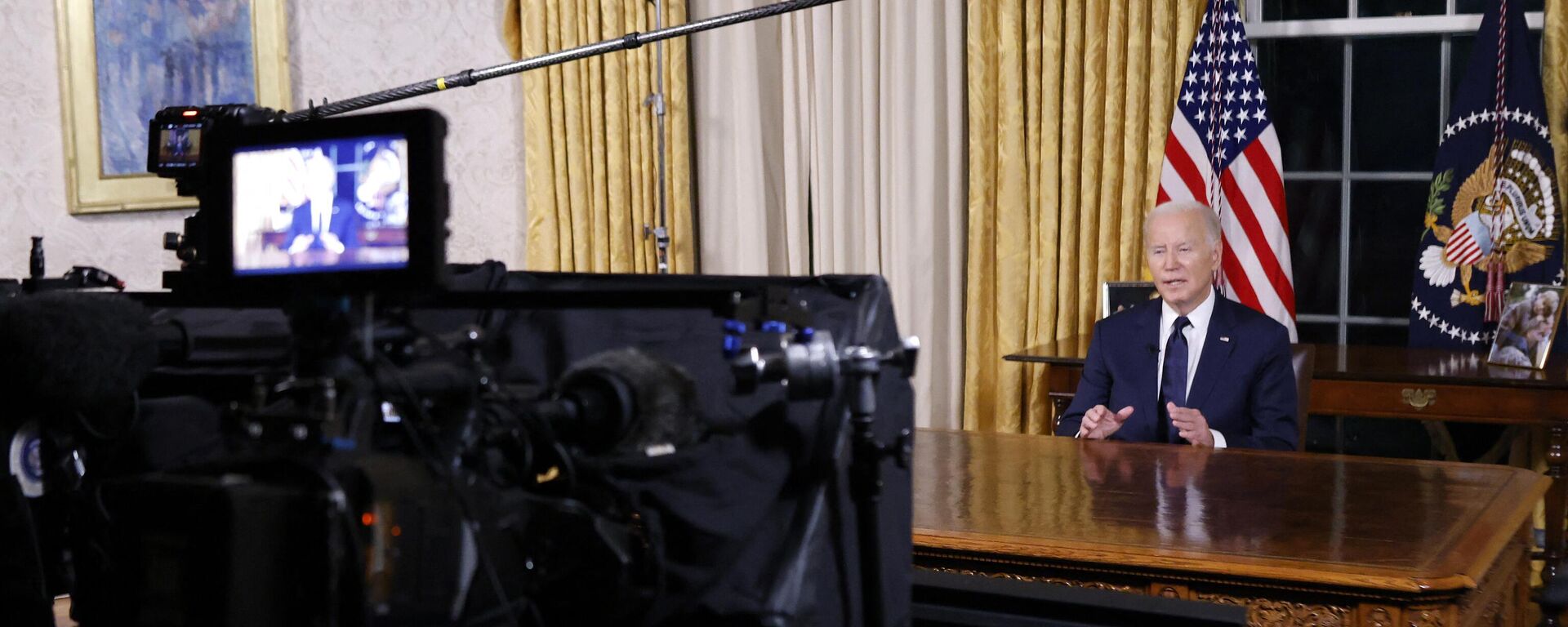https://en.sputniknews.africa/20231028/1063141019.html
May US Aid to Ukraine End Abruptly?
May US Aid to Ukraine End Abruptly?
Sputnik Africa
Last week, the US President Joe Biden sent a supplemental funding request of more than $105 billion to the Congress. It involves aid for Israel and Ukraine, as... 28.10.2023, Sputnik Africa
2023-10-28T15:23+0200
2023-10-28T15:23+0200
2023-10-28T16:40+0200
russia's special operation in ukraine
joe biden
ukraine
boris johnson
united states (us)
kiev
international
west
afghanistan
military aid
https://cdn1.img.sputniknews.africa/img/07e7/0a/1c/1063141197_0:0:3078:1731_1920x0_80_0_0_14e51a619a93667422e8905be96214d8.jpg
The newly elected House speaker has called for splitting Ukrainian and Israeli military packages, prompting the US mainstream press to raise the alarm over the fate of Team Biden's aid to Kiev.GOP Representative Mike Johnson, who has been tapped as the new House speaker, has a record of voting against sponsoring Washington's proxy war in Ukraine.Thus, unsurprisingly, when President Joe Biden requested a $105 billion package encompassing aid for Tel Aviv, Kiev, Taiwan and border security from the US Congress, Johnson insisted that those issues should be "bifurcated" and voted on separately.GOP Representative Michael McCaul of Texas, who serves as the chairman of the Foreign Affairs Committee, told the US press that despite Republicans being willing to support Kiev, it's highly likely that next week the House may pass an emergency spending bill "covering only Israel."Republicans are inclined to place Israel's needs above those of Ukraine for a number of reasons, as per Professor David Woodard, Clemson University political scientist and former political consultant for Republican congressmen.In addition to that, the Ukraine war "presents a problem the longer it continues," according to the political scientist. The Kiev regime's summer offensive has failed to meet the West's expectations with the Ukrainians making zero progress on the ground and sustaining tremendous losses in terms of both manpower and equipment.The continuation of Kiev's counteroffensive attempt in the fall has yet to show any results either. Moreover, the Biden administration has recently acknowledged that it expects Russia to make new tactical gains on the ground in the near future. Given Ukraine's inability to show progress, funding may become more controversial, per the political scientist.The Tet Offensive ended in early April 1968 as a military defeat for the Vietnamese communists. At the same time it indicated clearly to the US public that an overall victory in Vietnam was not imminent. This prompted 53% of American respondents to say that sending US troops to fight in Vietnam was a mistake, with just 35% believing that it wasn't in August 1968. Earlier, in March 1968, then US President Lyndon Johnson announced that he would not seek a second term. US historians agree that the Tet Offensive was the beginning of the end of Washington's Vietnam military adventure.Likewise, an October Ipsos poll concerning Washington's aid to Kiev indicated that US public support for arming Ukraine is continuing to decline. Currently, around 52% of Democrats support arming Ukraine, down from 61% in May. The majority of Republicans are opposed to sending weapons to Kiev, with the number of those supporting aid to Ukraine falling from 39% in May to 35%. On top of that, 56% of Republicans and 34% of Democrats believe that Ukraine's problems "are none of our business and we should not interfere."Still, Woodard believes that the White House won't cut Ukraine's aid abruptly: Team Biden does not want to look weak and susceptible to the GOP's pressure.
https://en.sputniknews.africa/20231020/1062939838.html
https://en.sputniknews.africa/20231011/thousands-of-americans-sign-petition-urging-biden-to-stop-sending-arms-to-israel-1062695137.html
ukraine
united states (us)
kiev
west
afghanistan
Sputnik Africa
feedback@sputniknews.com
+74956456601
MIA „Rossiya Segodnya“
2023
News
en_EN
Sputnik Africa
feedback@sputniknews.com
+74956456601
MIA „Rossiya Segodnya“
Sputnik Africa
feedback@sputniknews.com
+74956456601
MIA „Rossiya Segodnya“
joe biden, ukraine, boris johnson, united states (us), kiev, international, west, afghanistan, military aid
joe biden, ukraine, boris johnson, united states (us), kiev, international, west, afghanistan, military aid
May US Aid to Ukraine End Abruptly?
15:23 28.10.2023 (Updated: 16:40 28.10.2023) Last week, the US President Joe Biden sent a supplemental funding request of more than $105 billion to the Congress. It involves aid for Israel and Ukraine, as well as money for US border security.
The newly elected House speaker has called for splitting Ukrainian and Israeli military packages, prompting the US mainstream press to raise the alarm over the fate of Team Biden's aid to Kiev.
GOP Representative Mike Johnson, who has been tapped as the new House speaker, has a record of voting against sponsoring Washington's proxy war in Ukraine.
Thus, unsurprisingly, when President Joe
Biden requested a $105 billion package encompassing aid for Tel Aviv, Kiev, Taiwan and border security from the US Congress, Johnson insisted that those issues should be "bifurcated" and voted on separately.
"We're not going to abandon them," Johnson asserted to the press while referring to the Ukrainian military. "But we have a responsibility, a stewardship responsibility over the precious treasure of the American people and we have to make sure that the White House is providing the people with some accountability for the dollars."
GOP Representative Michael McCaul of Texas, who serves as the chairman of the Foreign Affairs Committee, told the US press that despite Republicans being willing to support Kiev, it's highly likely that next week the House may pass an emergency spending bill "covering only
Israel."
Republicans are inclined to place Israel's needs above those of Ukraine for a number of reasons, as per Professor David Woodard, Clemson University political scientist and former political consultant for Republican congressmen.
"The US was the first nation to recognize Israel as a nation-state in 1948 and both parties have supported it," Woodard told Sputnik. "Two Republican presidents, George H.W. Bush and George W. Bush conducted successful Middle East military campaigns and it was always said that the operations were to 'protect the state of Israel.' The Democrats have a painful memory of the Iranian Rescue Mission by the US when Jimmy Carter was president to rescue American hostages as a failed policy. Conservatives have closer ties to the Judeo-Christian legacy than the secular Democrats. The GOP candidates have a natural conservative allegiance to Israel, it goes very deep."
In addition to that, the Ukraine war "presents a problem the longer it continues," according to the political scientist. The Kiev regime's summer offensive has failed to meet the West's expectations with the Ukrainians making zero progress on the ground and sustaining tremendous losses in terms of both manpower and equipment.
The continuation of Kiev's counteroffensive attempt in the fall has yet to show any results either. Moreover, the Biden administration has recently acknowledged that it expects Russia to make new tactical gains on the ground in the near future. Given Ukraine's inability to show progress, funding may become more controversial, per the political scientist.
"American history shows that protracted wars are costly for presidents and their party," explained Woodard. "Abraham Lincoln had to have a Union victory in Atlanta to survive the 1864 election to a second term. Truman in Korea and Lyndon Johnson in Vietnam found that as military losses mount over time, the public becomes weary and they stepped aside for the next election. George W. Bush is the latest president to endure such criticism over time, so much so that he was hamstrung to act. If the fall military campaign is successful, I suspect that the US will stay involved, but you should remember that the Tet Offensive (1968) in Vietnam turned American public opinion against the war."
The Tet Offensive ended in early April 1968 as a military defeat for the Vietnamese communists. At the same time it indicated clearly to the
US public that an overall victory in Vietnam was not imminent. This prompted 53% of American respondents to say that sending US troops to fight in Vietnam was a mistake, with just 35% believing that it wasn't in August 1968. Earlier, in March 1968, then US President Lyndon Johnson announced that he would not seek a second term. US historians agree that the Tet Offensive was the beginning of the end of Washington's Vietnam military adventure.
Likewise, an October Ipsos poll concerning Washington's aid to Kiev indicated that US public support for arming Ukraine is continuing to decline. Currently, around 52% of Democrats support arming Ukraine, down from 61% in May. The majority of Republicans are opposed to sending weapons to Kiev, with the number of those supporting aid to Ukraine falling from 39% in May to 35%. On top of that, 56% of Republicans and 34% of Democrats believe that
Ukraine's problems "are none of our business and we should not interfere."
Still, Woodard believes that the White House won't cut Ukraine's aid abruptly: Team Biden does not want to look weak and susceptible to the GOP's pressure.
"For a time the US will try to fund both [Ukraine and Israel], but only for a short time. The withdrawal from Afghanistan by the Biden administration was a catastrophe for the president, he doesn't want to be seen as being weak after that incident and cutting from Kiev would be a public relations disaster," the political scientist concluded.




